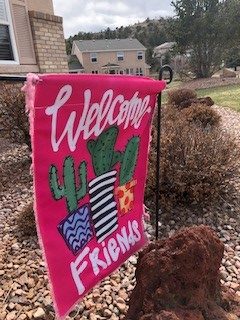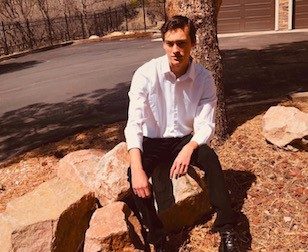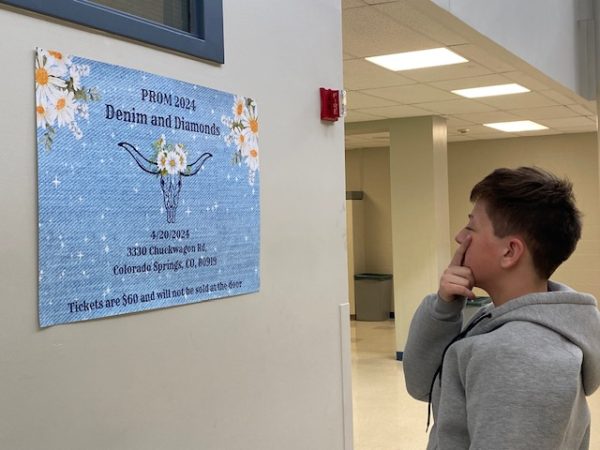Childhood to Adulthood: Nostalgia

A pink welcome flag, displaying a friendly message to all who pass by, blowing in the gentle breeze which often elicit feelings of nostalgia.
Have you ever had the feeling when you think back on good times and suddenly desire to be back there and relive them? Have you ever reminisced and yearned for what you once had? These common emotions and desires are all due to a friendly emotion called nostalgia.
“Experimental evidence indicates that nostalgia is experienced as an overwhelmingly positive emotion. It has the effect of boosting one’s mood as well as increasing a sense of meaning in life,” Professor of psychology David Ludden explained on Psychology Today. “It also raises self-esteem and optimism for the future.”
However, have you ever wondered why you only seem to recall the positive memories and your brain automatically blocks out any negative memories?
“When people are feeling nostalgic, they tend to remember the good things and forget about the bad. So, if an individual is feeling nostalgic for their childhood it will seem as if every day was perfect – even though that is highly unlikely to have been the case,” the editorial staff wrote in their article at AlcoholRehab.com.
So is nostalgia a good emotion or something potentially harmful to our health?
“It can also occur that people are so focused on the past that they fail to appreciate what they have in the present,” AlcoholRehab.com stated.
It remains clear in my mind how often I used to long for California when I first moved to Colorado. I missed my friends and my way of life. Seldom is it easy moving from your hometown to another state. I found myself steadily looking back on my past instead of moving forward with my life.
“Yes I do think nostalgia is a good thing because it provides most people with a sense of fondness and safety,” Air Academy junior Karis Boonzaaijer pointed out.
One may feel safe often when remembering their past lives and what they once had and cherished. Such memories and thoughts may provide a sense of accomplishment or safety as Boonzaaijer discussed.
“Nostalgia is one of the most beautiful human reactions to any object, place, sound, or character. Nostalgia seemingly unlocks doors to the past allowing us to reminisce on some of life’s most beautiful moments. Nostalgia like all other human emotions is normal and should not be frowned upon,” Marshall High School senior Sameer Ameen added.
In 2019, I flew back to California in pursuit of ridding myself of a feeling of nostalgia that constantly continued to bother me. Upon arriving though, I realized that nostalgia is not something to fret upon. In fact, nostalgia is a powerful inspiration for my ambitions and my past will always be a firm part of the foundation of who I am and my identity.
“I believe the past cultivates who you are now but does not define you as a person,” Boonzaaijer said.
Withal, Ameen goes into depth as to what it means to remember where one comes from.
“Listening to songs of my childhood or visiting places where I grew up allow me to relive some of the happiest and darkest moments of my life. Reflection is important and nostalgia plays a key role in it,” Ameen stated.
Despite nostalgia being an emotion centered around positive memories, it does not mean one cannot remember upsetting pasts as well. However, instead of feeling the negative energies around such memories, nostalgia tends to distort your views of it into a more positive light.
“As a son to immigrant parents, it’s important for me to understand not only my own past but the past of my family. The struggles and the hardships that brought my parents here. The pain and the sacrifice that allowed me to live a good life,” Ameen reflected.
Several people have witnessed hardships and obstacles in life. Many times, such childhoods shape the type of decisions one makes soon.
“I think remembering your past is important because your childhood has given you so many life experiences and memories that you wouldn’t want to throw away,” Boonzaaijer pondered.
Mistakes and blunders provide space for growth and blossoming. Childhood is like a sandbox for one to experiment and learn the ropes and way of life; to gently ease into the world of adulthood.

A photograph with shades of grey featuring a young child carried by his father. The child seems to be frowning and almost as if pondering about deep matters. Sometimes nostalgia will lead us to look back and frown that we no longer have what we once had“My own past is important to me because it defines who I am. Decisions of the past, mistakes of the past, relationships of the past, all influence my life today,” Ameen added to his initial claim.
People who have spent a large part of their lives studying history may have enlightening knowledge upon these commons feelings of nostalgia.
“As someone who loves the past, I am very nostalgic. The past is neither good nor bad, what you do with your past is what is important,” Air Academy world history teacher Barry Clark explained. “Your past should not define you but drive you to a better future. Some of us may have a more solid foundation but lack grit to make it, while others may have the grit to overcome a weak foundation.”
Therefore, Clark implies that one’s past should not define the outcome of your adulthood and your near future, but only determine the several building blocks one must take to reach that future.
“My past has helped me become who I am. With every experience, I was able to choose how I would let them impact me. Nostalgia is choosing to let the past be a launch pad and not an anchor. After meeting many people of many backgrounds I feel safe saying anything is possible to overcome, all it takes is grit. While in the same breath I have seen many choose to let the past be an anchor and keep them down. I choose to make my past something to inspire me,” Clark remarked.
After all, should our past be something to fear or neglect? Should it be something to push aside out of worry that it may prevent us from living in the present?
Ameen finishes with a powerful statement:
“To understand one’s character, you must visit their past. Knowing where someone came from can give you a deep understanding of who they are. The rich history of one’s past is key to unlocking the decisions of their future.”

How’s it hanging guys? My name is Angel B. Jimenez and it's my first year here at the Jetstream Journal. I’m super excited to explore the corridors...












